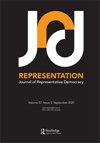Why do Parties Select Non-Partisan Ministers? The Paradox of Ministerial Selection in Austria
Q2 Social Sciences
引用次数: 4
Abstract
ABSTRACT This article seeks to contribute to the bourgeoning debate about technocratic, non-political and non-partisan ministers in party government regimes. At the centre of this study is the identification and analysis of a major paradox – a sizeable number and share of non-partisan ministers operating at the core of an otherwise exceptionally party-centered regime, the Second Austrian Republic, which has widely been considered to mark the epitome of the party state in Europe. The discussion of this phenomenon highlights the importance of particular strategic considerations among political decision-makers that have been largely ignored in the extant literature on ministerial selection and de-selection. We argue that in contexts marked by advanced levels of anti-party sentiment, non-partisan ministers can bring major benefit to the government in terms of legitimacy, popularity and support, and at a rather low cost or risk. As they tend to have few if any party resources of their own, non-partisan ministers can be easily removed whenever deemed politically expedient.为什么政党选择无党派部长?奥地利部长选择的悖论
摘要本文旨在为党政府中关于技术官僚、非政治和无党派部长的激烈辩论做出贡献。这项研究的核心是识别和分析一个主要的悖论——相当多的无党派部长在一个异常以政党为中心的政权奥地利第二共和国的核心运作,该政权被广泛认为是欧洲政党国家的缩影。对这一现象的讨论突显了政治决策者中特定战略考虑的重要性,而在现存的关于部长选拔和取消选拔的文献中,这些考虑在很大程度上被忽视了。我们认为,在反党派情绪高涨的背景下,无党派部长可以以相当低的成本或风险,在合法性、受欢迎程度和支持度方面为政府带来重大利益。由于他们自己的党派资源往往很少,只要认为政治上有利,无党派部长就可以很容易地被免职。
本文章由计算机程序翻译,如有差异,请以英文原文为准。
求助全文
约1分钟内获得全文
求助全文
来源期刊

Representation
Social Sciences-Sociology and Political Science
CiteScore
3.50
自引率
0.00%
发文量
31
期刊介绍:
This change in scope follows two paths. Firstly, it seeks contributors who are interested in exploring the interface between democratic practice and theory. In particular, this focus seeks contributions that apply theoretical insights to actual examples of current practice. Secondly, while not neglecting the current focus of the journal, we would like to expand its international coverage so that the journal will offer our readers insights in the state of democracy worldwide.
 求助内容:
求助内容: 应助结果提醒方式:
应助结果提醒方式:


